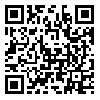Tue, Jul 1, 2025
[Archive]
Volume 14, Issue 4 (9-2024)
JABS 2024, 14(4): 263-273 |
Back to browse issues page
Ethics code: (IR.SUMS.REC.1402.144).
Download citation:
BibTeX | RIS | EndNote | Medlars | ProCite | Reference Manager | RefWorks
Send citation to:



BibTeX | RIS | EndNote | Medlars | ProCite | Reference Manager | RefWorks
Send citation to:
Hamidizadeh S, Zarei A, Parviniannasab A M, Ahmadi Marzaleh M, Rahimi E, Bijani M. Challenges Affecting Quality Services Delivery from the Perspective of Pre-Hospital Emergency Personnel: A Qualitative Content Analysis. JABS 2024; 14 (4) :263-273
URL: http://jabs.fums.ac.ir/article-1-3096-en.html
URL: http://jabs.fums.ac.ir/article-1-3096-en.html
Saeed Hamidizadeh1 

 , Ali Zarei1
, Ali Zarei1 

 , Ali Mohammad Parviniannasab2
, Ali Mohammad Parviniannasab2 

 , Milad Ahmadi Marzaleh3
, Milad Ahmadi Marzaleh3 

 , Ebrahim Rahimi4
, Ebrahim Rahimi4 

 , Mostafa Bijani *5
, Mostafa Bijani *5 




 , Ali Zarei1
, Ali Zarei1 

 , Ali Mohammad Parviniannasab2
, Ali Mohammad Parviniannasab2 

 , Milad Ahmadi Marzaleh3
, Milad Ahmadi Marzaleh3 

 , Ebrahim Rahimi4
, Ebrahim Rahimi4 

 , Mostafa Bijani *5
, Mostafa Bijani *5 


1- Department of Nursing, Abadeh School of Nursing, Shiraz University of Medical Sciences, Shiraz, Iran
2- Department of Nursing, School of Nursing, Larestan University of Medical Sciences, Lar, Iran
3- Department of Healthcare Services Management, Clinical Education Research Center, School of Health Management and Information Sciences, Shiraz University of Medical Sciences, Shiraz, iran
4- Mamsani School of Allied Medical Sciences, Shiraz University of Medical Sciences, Shiraz, Iran
5- Department of Medical Surgical Nursing, School of Nursing, Fasa University of Medical Sciences, Fasa, Iran ,bizhani_mostafa@yahoo.com
2- Department of Nursing, School of Nursing, Larestan University of Medical Sciences, Lar, Iran
3- Department of Healthcare Services Management, Clinical Education Research Center, School of Health Management and Information Sciences, Shiraz University of Medical Sciences, Shiraz, iran
4- Mamsani School of Allied Medical Sciences, Shiraz University of Medical Sciences, Shiraz, Iran
5- Department of Medical Surgical Nursing, School of Nursing, Fasa University of Medical Sciences, Fasa, Iran ,
Abstract: (901 Views)
Background & Objectives: The pre-hospital emergency medical service (EMS), serving as the first line of care and treatment for patients and injured individuals, holds paramount importance in the healthcare system. Identifying the challenges and problems facing this system is crucial for its improvement. This study aimed to elucidate the challenges affecting the delivery of quality services from the perspective of pre-hospital EMS personnel in southern Iran.
Materials & Methods: This qualitative descriptive study investigated the views of pre-hospital EMS personnel (N=23) selected through purposive sampling. Data were collected via semi-structured in-depth interviews and analyzed using conventional content analysis methods as described by Graneheim and Lundman.
Results: The analysis revealed three main themes: organizational challenges (encompassing lack of human resources, equipment shortages, and structural-administrative issues), human resources challenges (including individual characteristics of personnel and staff dissatisfaction), and cultural-social challenges (comprising cultural barriers and environmental-social obstacles). These themes were further divided into seven subthemes.
Conclusion: Organizational, human resources, and socio-cultural challenges emerged as the most significant factors affecting the delivery of quality services in Iran's pre-hospital EMS system. Policy-makers and administrators can leverage these findings to develop strategies aimed at addressing the challenges impacting the delivery of quality pre-hospital emergency services.
Materials & Methods: This qualitative descriptive study investigated the views of pre-hospital EMS personnel (N=23) selected through purposive sampling. Data were collected via semi-structured in-depth interviews and analyzed using conventional content analysis methods as described by Graneheim and Lundman.
Results: The analysis revealed three main themes: organizational challenges (encompassing lack of human resources, equipment shortages, and structural-administrative issues), human resources challenges (including individual characteristics of personnel and staff dissatisfaction), and cultural-social challenges (comprising cultural barriers and environmental-social obstacles). These themes were further divided into seven subthemes.
Conclusion: Organizational, human resources, and socio-cultural challenges emerged as the most significant factors affecting the delivery of quality services in Iran's pre-hospital EMS system. Policy-makers and administrators can leverage these findings to develop strategies aimed at addressing the challenges impacting the delivery of quality pre-hospital emergency services.
Keywords: Emergency Medical Services, Emergency Medical Services Personnel Challenges, Qualitative Research
Type of Study: Research |
Subject:
Community Medicine
Received: 2024/08/9 | Accepted: 2024/09/28 | Published: 2024/12/21
Received: 2024/08/9 | Accepted: 2024/09/28 | Published: 2024/12/21
Send email to the article author
| Rights and permissions | |
 |
This work is licensed under a Creative Commons Attribution-NonCommercial 4.0 International License. |

This work is licensed under a Creative Commons — Attribution-NonCommercial 4.0 International (CC BY-NC 4.0)



